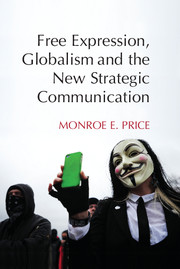Book contents
- Frontmatter
- Contents
- Acknowledgments
- 1 Moving the Needle, Filling the Streets
- 2 Strategic Communication and the Foundations of Free Expression
- 3 Narratives of Legitimacy
- 4 Strategies of the Diagnostic
- 5 Asymmetries and Strategic Communication
- 6 Strategies of System Architecture
- 7 Soft Power, Soft War
- 8 Religions and Strategic Communication
- 9 Regulating NGOs in the Market for Loyalties
- 10 Strategic Platforms
- 11 Strategic Communication and Satellite Channels
- 12 Strategies of Closure, Markers of Anxiety
- Bibliography
- Index
- References
11 - Strategic Communication and Satellite Channels
Published online by Cambridge University Press: 18 December 2014
- Frontmatter
- Contents
- Acknowledgments
- 1 Moving the Needle, Filling the Streets
- 2 Strategic Communication and the Foundations of Free Expression
- 3 Narratives of Legitimacy
- 4 Strategies of the Diagnostic
- 5 Asymmetries and Strategic Communication
- 6 Strategies of System Architecture
- 7 Soft Power, Soft War
- 8 Religions and Strategic Communication
- 9 Regulating NGOs in the Market for Loyalties
- 10 Strategic Platforms
- 11 Strategic Communication and Satellite Channels
- 12 Strategies of Closure, Markers of Anxiety
- Bibliography
- Index
- References
Summary
I turn to a relatively arcane subject: regulating the use of satellite transponders to reach across national boundaries and significantly affect target audiences. Techniques of supervision related to satellite positions in geostationary orbit, the use of their transponders and the efforts to manage the signals have been an exercise in governing seemingly ungovernable phenomena. In the last three decades of the twentieth century, a vast infrastructure of communication satellites – new trade routes in the sky, as I have called them – was built. Strategic communicators – commercial, religious, ideological – were provided new opportunities, new apertures for entry into previously closed markets. A combination of state industrial policies and, later, private entrepreneurship shaped the nature of these structures and set the backdrop for experimentation with potential uses of the new transmission opportunities by new players that would alter existing information flows. Strategic communicators – often delivering powerful and polarizing messages, even menacing and hate-filled – find their way onto satellites. Often this is a result of the relatively invisible and laissez-faire mode of leasing time on the transponders that satellites carry and downlinking those signals direct to homes or to cable operations in territories within the satellite footprint.
Gaining transponder leasing rights has been a matter, especially in the United States, of private negotiation, not an appeal to administrative authorities. No overarching international scheme of regulation has emerged. What did occur is significant; in the absence of such an overall regulatory scheme, patterns of “informal governance” arose. These informal practices frequently resulted in ad hoc, often ragged policies, hidden repression and novel arrangements. In such a system of informal governance, paradoxically, what constitutes “freedom of expression” can get lost. Because of the challenge of governing the ungovernable, and regulating the unregulable, the history of satellite regulation has been something of a dress rehearsal for the current Internet debate, in which battles over the question of the resilience of state control have grown sharper and more contested.
- Type
- Chapter
- Information
- Free Expression, Globalism, and the New Strategic Communication , pp. 216 - 238Publisher: Cambridge University PressPrint publication year: 2014



